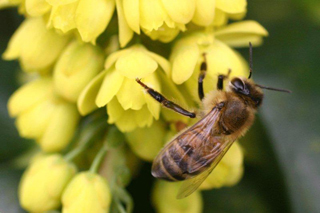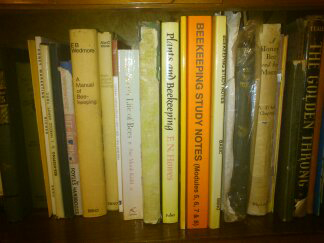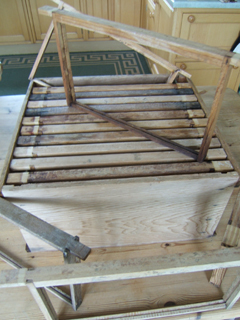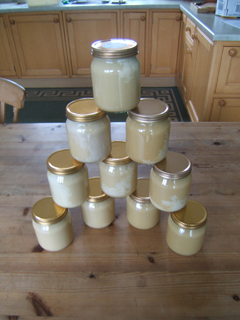 With all the mild weather we’ve experienced this autumn, it looks very much like a repeat of last year at this time. The bees, instead of cuddling together to make a tight, winter cluster (as they do in the colder weather) have been wandering around the hive, cleaning out any remains of honey in partially emptied cells, and have been using this to feed their young – which the queen has continued producing because the mild weather has allowed the bees to maintain the brood nest temperature at its required 35コ without massive expenditure of stores (ie energy).
With all the mild weather we’ve experienced this autumn, it looks very much like a repeat of last year at this time. The bees, instead of cuddling together to make a tight, winter cluster (as they do in the colder weather) have been wandering around the hive, cleaning out any remains of honey in partially emptied cells, and have been using this to feed their young – which the queen has continued producing because the mild weather has allowed the bees to maintain the brood nest temperature at its required 35コ without massive expenditure of stores (ie energy).
 The older bees have also continued foraging, though there is little out there for them apart from the likes of mahonia and the few winter (?) flowering shrubs that are around now. This means that the older, foraging bees will die out sooner than usual at this time of year, so as we progress into January and February the number of bees in the colony will have reduced prematurely, thus rendering their survival into the Spring months a less likely possibility. There is nothing I (or any other beekeeper) can do to mitigate against this, other than ensure that the colonies all have sufficient stores of honey to satisfy their (early Spring) requirements, but I can’t control the natural die-off rate of the bees through climate change.
The older bees have also continued foraging, though there is little out there for them apart from the likes of mahonia and the few winter (?) flowering shrubs that are around now. This means that the older, foraging bees will die out sooner than usual at this time of year, so as we progress into January and February the number of bees in the colony will have reduced prematurely, thus rendering their survival into the Spring months a less likely possibility. There is nothing I (or any other beekeeper) can do to mitigate against this, other than ensure that the colonies all have sufficient stores of honey to satisfy their (early Spring) requirements, but I can’t control the natural die-off rate of the bees through climate change.
Just before Christmas, I took off some more honey supers from those hives which still had them in place, resulting in about 5 supers of ivy honey for processing. It is normally a bit late for doing this, as the bees are best left alone during the winter months – but these aren’t the winter months! The bees were flying and up in the supers, just like they would be in early Spring, so they weren’t disturbed, as such.
 If I did this in the depths of an icy-cold winter when the bees were huddled together, the bees might be tempted to break their cluster, chill and die- or worse, might “ball” their queen to protect her, thereby inadvertently suffocating her, and as a result ensuring the protracted death of the colony. This weather is weird – and not right! I really worry about our planet and global warming – and feel so sorry for those people up North who have been flooded out, some yet again, over the Christmas period, due in no small part to the climate change we are going through. Pity our grandchildren!
If I did this in the depths of an icy-cold winter when the bees were huddled together, the bees might be tempted to break their cluster, chill and die- or worse, might “ball” their queen to protect her, thereby inadvertently suffocating her, and as a result ensuring the protracted death of the colony. This weather is weird – and not right! I really worry about our planet and global warming – and feel so sorry for those people up North who have been flooded out, some yet again, over the Christmas period, due in no small part to the climate change we are going through. Pity our grandchildren!

With the New Year nearly upon us, it is time for planning and preparing for the season ahead. I am gathering together my queen rearing equipment and making sure I have enough of all the bits and bobs that are necessary for this. Also, I have started on the repairs to hive parts and re-painting of wooden components to better protect against the weather, in order that the bees will continue to have a dry and weather-proof home. It’s full-on! Whoever said beekeeping is a seasonal hobby? It’s all year round! Mind you, that’s part of the attraction, the fact that there is always something different to do to maintain that involvement with the bees throughout the year.

And when all the maintenance tasks are done, or if I feel like sitting down to relax for a while, now is the time to pick up one of the many beekeeping books in my library and refresh or further my knowledge on the subject. There is always something to learn, or something new to try. My wife found an old beekeeping book in the Oxfam charity shop before Christmas (do you see, now, how low-maintenance I am?!), which, as it turned out, I already had, albeit her copy was a wartime copy, printed on very thin paper with close type – but hardback. Lovely! However, whilst browsing through it to remind myself of its contents, I’ve already found two things (although I’ve read the later version) which I will try in the coming season. I’m really quite excited and enthused about this. Sad, really!
I hope you all had a wonderful Christmas and wishing you a Happy and Healthy New Year.
Colin Rees – 01872 501313 – colinbeeman@aol.com
